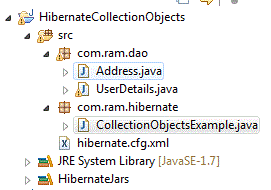In this example we will see how to store a collection of objects. If we have a set of address objects, then
they can be stored in the data base as shown in the below example. The output of collection objects is generated
in a separate table.
<?xml version='1.0' encoding='utf-8'?>
<!DOCTYPE hibernate-configuration PUBLIC
"-//Hibernate/Hibernate Configuration DTD 3.0//EN"
"http://www.hibernate.org/dtd/hibernate-configuration-3.0.dtd">
<hibernate-configuration>
<session-factory>
<!-- Database connection settings -->
<property name="connection.driver_class">oracle.jdbc.driver.OracleDriver</property>
<property name="connection.url">jdbc:oracle:thin:@localhost:1521:xe</property>
<property name="connection.username">hr</property>
<property name="connection.password">hr</property>
<!-- JDBC connection pool (use the built-in) -->
<property name="connection.pool_size">1</property>
<!-- SQL dialect -->
<property name="dialect">org.hibernate.dialect.OracleDialect</property>
<!-- Disable the second-level cache -->
<property name="cache.provider_class">org.hibernate.cache.NoCacheProvider</property>
<!-- Echo all executed SQL to stdout -->
<property name="show_sql">true</property>
<!-- Drop and re-create the database schema on startup -->
<property name="hbm2ddl.auto">create</property>
<!-- Names the annotated entity class -->
<mapping class="com.ram.dao.UserDetails"/>
<mapping class="com.ram.dao.Address"/>
</session-factory>
</hibernate-configuration>
package com.ram.dao;
import javax.persistence.Embeddable;
@Embeddable
public class Address {
private String street;
private String city;
private String state;
public String getStreet() {
return street;
}
public void setStreet(String street) {
this.street = street;
}
public String getCity() {
return city;
}
public void setCity(String city) {
this.city = city;
}
public String getState() {
return state;
}
public void setState(String state) {
this.state = state;
}
}
package com.ram.dao;
import java.util.HashSet;
import java.util.Set;
import javax.persistence.ElementCollection;
import javax.persistence.Entity;
import javax.persistence.GeneratedValue;
import javax.persistence.GenerationType;
import javax.persistence.Id;
@Entity
public class UserDetails {
@Id
@GeneratedValue(strategy=GenerationType.AUTO)
private int userId;
private String userName;
@ElementCollection
private Set listOfAddresses = new HashSet();
public int getUserId() {
return userId;
}
public void setUserId(int userId) {
this.userId = userId;
}
public String getUserName() {
return userName;
}
public void setUserName(String userName) {
this.userName = userName;
}
public Set getListOfAddresses() {
return listOfAddresses;
}
public void setListOfAddresses(Set listOfAddresses) {
this.listOfAddresses = listOfAddresses;
}
}
package com.ram.hibernate;
import org.hibernate.Session;
import org.hibernate.SessionFactory;
import org.hibernate.cfg.Configuration;
import com.ram.dao.Address;
import com.ram.dao.UserDetails;
public class CollectionObjectsExample {
public static void main(String[] args) {
UserDetails userDetails = new UserDetails();
userDetails.setUserName("Ram");
Address address1 = new Address();
address1.setStreet("Richmond");
address1.setCity("Melbourne");
address1.setState("Victoria");
Address address2 = new Address();
address2.setStreet("Parramatta");
address2.setCity("Sydney");
address2.setState("NSW");
userDetails.getListOfAddresses().add(address1);
userDetails.getListOfAddresses().add(address2);
SessionFactory sessionFactory = new Configuration().configure().buildSessionFactory();
Session session = sessionFactory.openSession();
session.beginTransaction();
session.save(userDetails);
session.getTransaction().commit();
session.close();
}
}





No comments:
Post a Comment